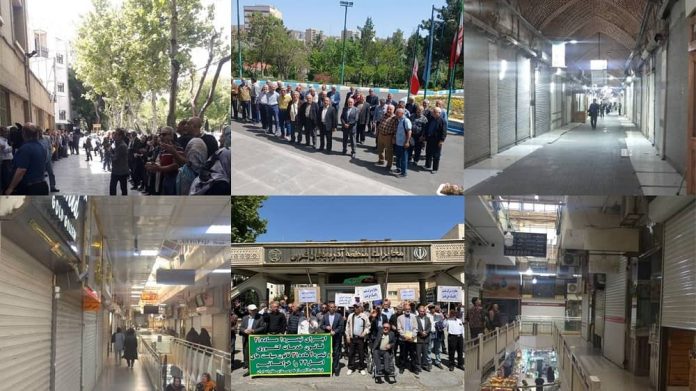Iran News: Economic Anguish Fuels Mass Protests and Strikes Across Iran

Written by
Sedighe Shahrokhi
In Tehran, the gold bazaar went on strike, protesting against steep increases in taxes, while retirees from the Telecommunications Company of Iran (TCI) rallied, decrying the regime’s disregard for their demands for higher pensions. Their chants reverberated with messages like “Instead of managers, the company is run by the military.”
April 29—Tabriz, northwest #Iran
Gold merchants on strike in protest to new legislation that levies heavy taxes on their sales.#IranProtests pic.twitter.com/Y7z92xsrhO— People's Mojahedin Organization of Iran (PMOI/MEK) (@Mojahedineng) April 29, 2024
In Shush, southwest Iran, workers of Pars Paper continued their strikes and protests in front of the governorate, underscoring persistent labor disputes.
Similarly, in Kermanshah, TCI retirees and pensioners took to the streets to protest low pensions and poor living conditions, lamenting that “The main shareholders have stolen our shares.”
April 29—Shush, southwest #Iran
Workers of Pars Paper continue strikes and protests in front of Shush governorate.#IranProtestspic.twitter.com/GXr1k4IoJX— People's Mojahedin Organization of Iran (PMOI/MEK) (@Mojahedineng) April 29, 2024
In Tabriz, northwest Iran, gold merchants initiated a strike against new legislation imposing heavy taxes on their sales, while retirees from the Telecommunications Company of Iran resumed their protests in front of the provincial office, demanding the implementation of laws requiring the adjustment of pensions according to the costs of living.
In Sanandaj and Khorramabad, western Iran, retired employees of the Telecommunications Company of Iran held protest rallies, demanding the implementation of a law passed in 2010 that mandates the government to adjust their pensions according to the costs of living. They criticized the regime for ignoring its own laws.
April 29—Sanandaj, western #Iran
Retired employees of the Telecommunications Company of Iran hold protest rally, demanding the implementation of a law passed in 2010 that requires the government to adjust their pensions according to the costs of living. #IranProtests pic.twitter.com/BYHydJC8C3— People's Mojahedin Organization of Iran (PMOI/MEK) (@Mojahedineng) April 29, 2024
Lastly, in Ardebil and Urmia, northwest Iran, TCI retirees and pensioners gathered to protest low pensions and poor living conditions, accusing both the shareholders and the government of betrayal. Despite their persistent demands, the regime continued to ignore their plight.
These widespread protests and strikes underscore the deep-rooted economic and social challenges facing Iran, as citizens express their frustrations with government policies and neglect.

